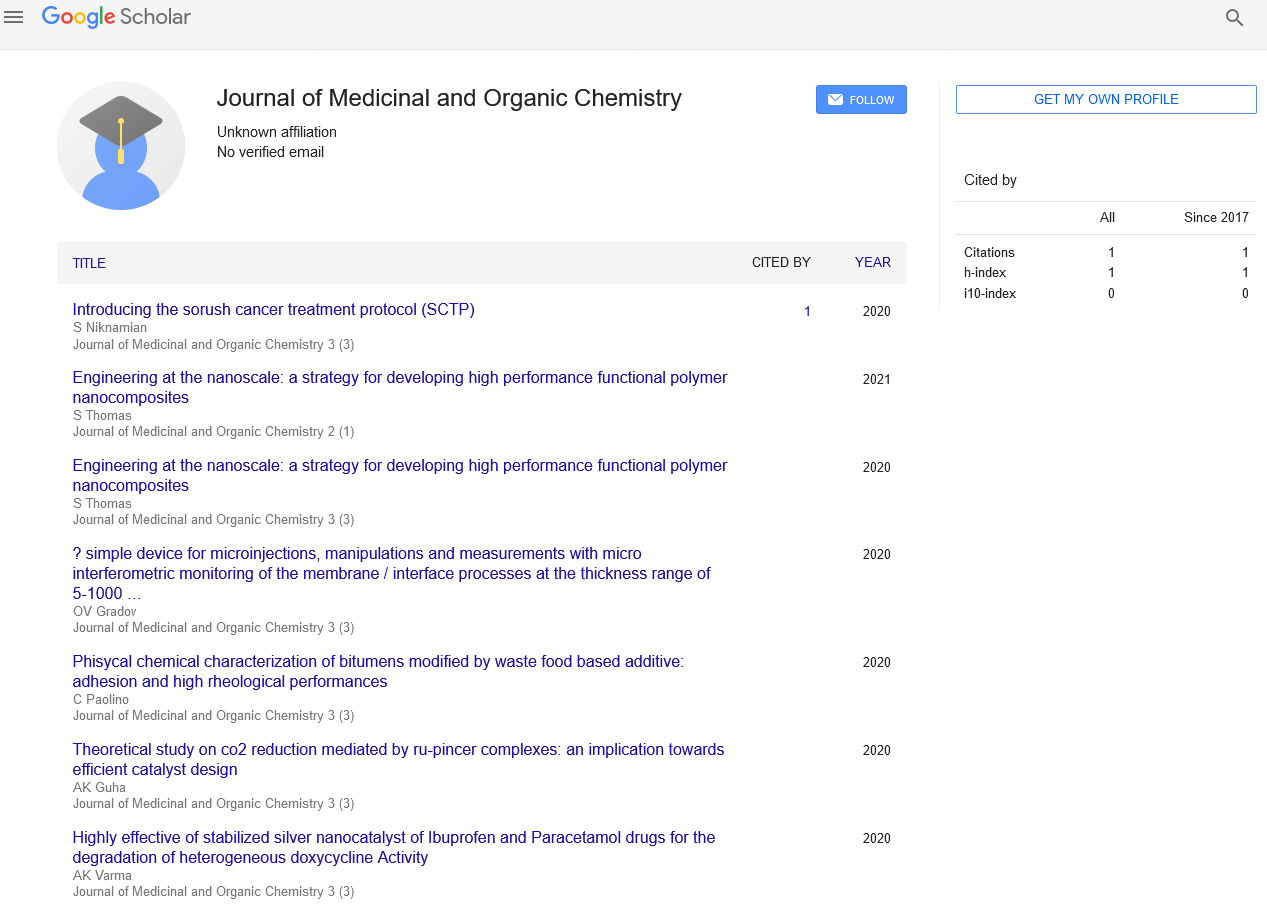Perspective - Journal of Medicinal and Organic Chemistry (2024) Volume 7, Issue 1
Elevating Care: The Pursuit of Quality Healthcare Services
- Corresponding Author:
- A. Rus Hoelzel
Department of Hospital Management,
University of Bristol,
Bristol,
UK
E-mail: durhama@r.hoelzel.ac.uk
Received: 25-Jan-2024, Manuscript No. jmoc-24-126344; Editor assigned: 30-Jan-2024, PreQC No. jmoc-24-126344 (PQ); Reviewed: 13-Feb-2024, QC No. jmoc-24-126344; Revised: 22-Feb-2024, Manuscript No. jmoc-24-126344 (R); Published: 29-Feb-2024, DOI: 10.37532/jmoc.2024.7(1).171-172
Introduction
Quality healthcare services are fundamental to promoting individual well-being, enhancing health outcomes and fostering trust in healthcare systems. From ensuring patient safety and satisfaction to optimizing clinical effectiveness and efficiency, quality healthcare encompasses a holistic approach to delivering safe, timely, equitable, effective, efficient and patient-centered care. In this comprehensive exploration, we delve into the essential components, innovative strategies and transformative impact of quality healthcare services on patient experiences and population health.
Description
Defining quality healthcare
Quality healthcare encompasses the delivery of services that meet or exceed established standards of safety, effectiveness, patient-centeredness, timeliness, efficiency and equity. The institute of medicine’s landmark report, “crossing the quality chasm,” identified six dimensions of quality safety, effectiveness, patient-centeredness, timeliness, efficiency and equity that serve as guiding principles for achieving high-quality care. By addressing these dimensions comprehensively, healthcare providers and organizations can optimize care delivery and improve health outcomes for individuals and communities.
Patient safety
Patient safety is paramount in quality healthcare, encompassing efforts to prevent medical errors, adverse events, and healthcare-associated infections. Healthcare providers implement evidencebased practices such as hand hygiene, medication reconciliation and surgical safety checklists to minimize the risk of harm to patients. Additionally, initiatives such as incident reporting systems, root cause analysis and continuous quality improvement efforts facilitate organizational learning and promote a culture of safety within healthcare institutions.
Clinical effectiveness
Clinical effectiveness refers to the delivery of care that is based on the best available evidence and leads to desired health outcomes. Evidence-based practices, clinical guidelines and standardized protocols guide healthcare providers in delivering appropriate diagnostic tests, treatments and interventions to patients. Clinical decision support tools, electronic health records and quality metrics enable providers to monitor adherence to best practices, identify opportunities for improvement and optimize clinical outcomes across diverse patient populations.
Patient-centered care
Patient-centered care emphasizes the importance of involving patients in healthcare decisions, respecting their preferences, values and cultural beliefs and fostering collaborative partnerships between patients and providers. Healthcare organizations employ strategies such as shared decision-making, patient education and care coordination to empower patients to actively participate in their care. Moreover, patient feedback mechanisms, satisfaction surveys and patient advisory councils enable healthcare providers to solicit input from patients and families, identify areas for improvement and enhance the patient experience.
Timeliness
Timeliness in healthcare refers to the provision of care in a timely manner, minimizing delays in access to services and reducing wait times for appointments, consultations and treatments. Efficient appointment scheduling, streamlined referral processes and telemedicine services facilitate timely access to care for patients, particularly those in underserved or rural areas. Moreover, strategies such as care coordination, case management and electronic health records enhance communication and information sharing among healthcare providers, promoting timely and coordinated care delivery.
Efficiency
Efficiency in healthcare entails the optimal use of resources to achieve desired health outcomes while minimizing waste, redundancies and unnecessary costs. Healthcare organizations adopt strategies such as lean management, process improvement initiatives and utilization review programs to streamline workflows, reduce inefficiencies and enhance resource allocation. Additionally, value-based care models, bundled payment arrangements and accountable care organizations incentivize providers to deliver high-quality care in a cost-effective manner, aligning financial incentives with patient outcomes and population health goals.
Equity
Equity in healthcare involves ensuring that all individuals have access to high-quality care, regardless of their socio-economic status, race, ethnicity, gender or geographic location. Healthcare organizations implement initiatives such as culturally competent care, language interpretation services and health equity training to address disparities in access to care and health outcomes among marginalized populations. Moreover, policy interventions, community partnerships and advocacy efforts aim to address social determinants of health and promote health equity across diverse communities.
Innovative strategies for quality improvement
Innovative approaches to quality improvement leverage technology, data analytics and interdisciplinary collaboration to enhance care delivery, optimize outcomes and promote patientcenteredness. Telehealth and remote monitoring technologies expand access to care, particularly in underserved areas or during public health emergencies. Artificial intelligence and machine learning algorithms facilitate predictive analytics, risk stratification and personalized interventions to improve clinical decision-making and patient outcomes. Furthermore, interdisciplinary care teams, care coordination models and patientcentered medical homes promote holistic, teambased approaches to managing complex health needs and chronic conditions.
The transformative impact of quality healthcare
Quality healthcare services have a transformative impact on individual health outcomes, healthcare delivery systems and population health at large. By prioritizing patient safety, clinical effectiveness, patient-centeredness, timeliness, efficiency and equity, healthcare organizations can enhance patient experiences, improve health outcomes and reduce healthcare costs. Moreover, quality healthcare services contribute to building trust and confidence in healthcare systems, fostering patient engagement and promoting preventive care and wellness initiatives that address the root causes of disease and promote overall well-being.
Conclusion
Quality healthcare services are essential for promoting individual health, enhancing healthcare delivery systems and advancing population health goals. By prioritizing safety, effectiveness, patient-centeredness, timeliness, efficiency and equity, healthcare organizations can optimize care delivery, improve patient experiences and achieve better health outcomes for individuals and communities. As we continue to innovate and evolve in the pursuit of quality healthcare, let us remain committed to the principles of excellence, compassion and equity, ensuring that every individual has access to the high-quality care they need and deserve.

